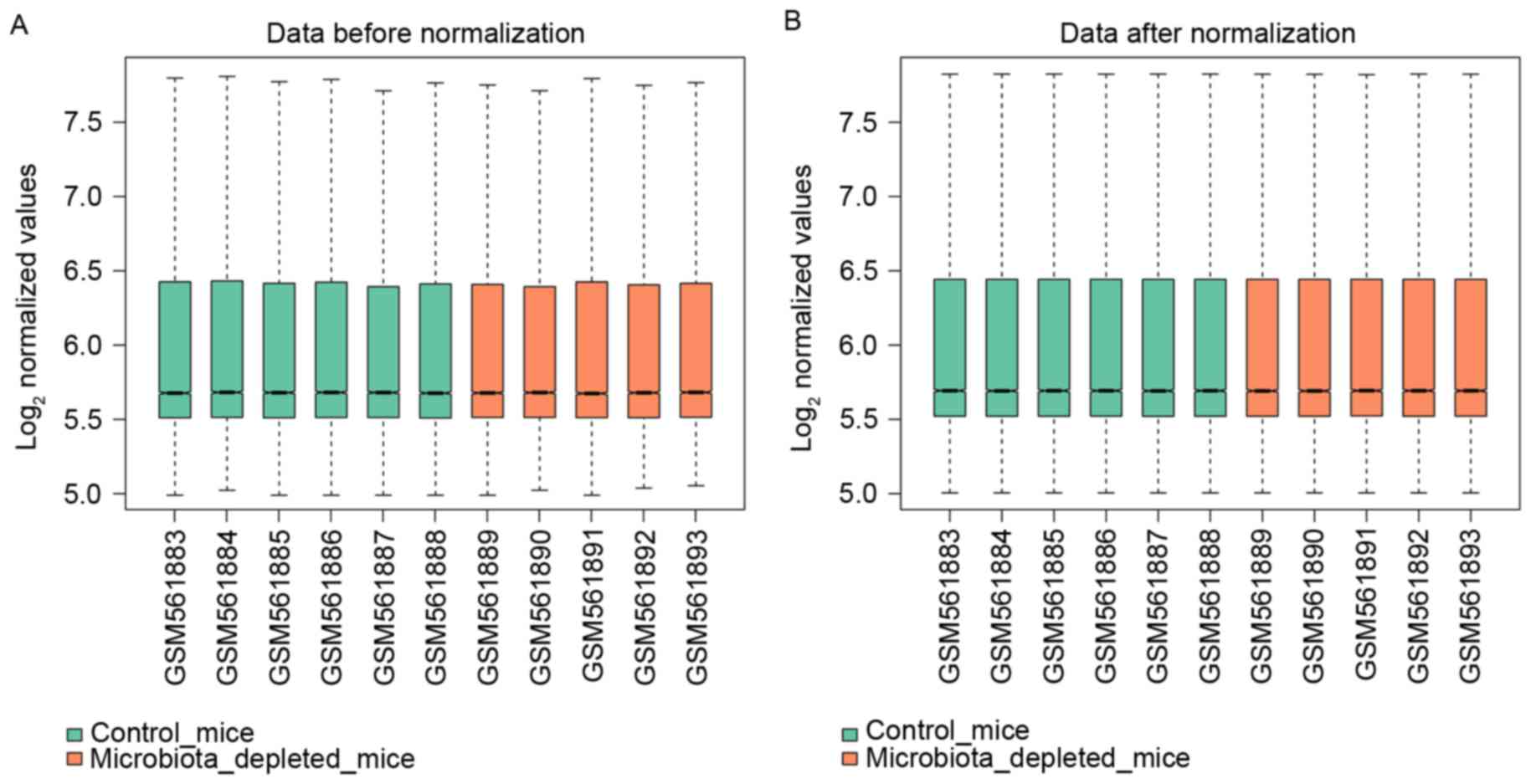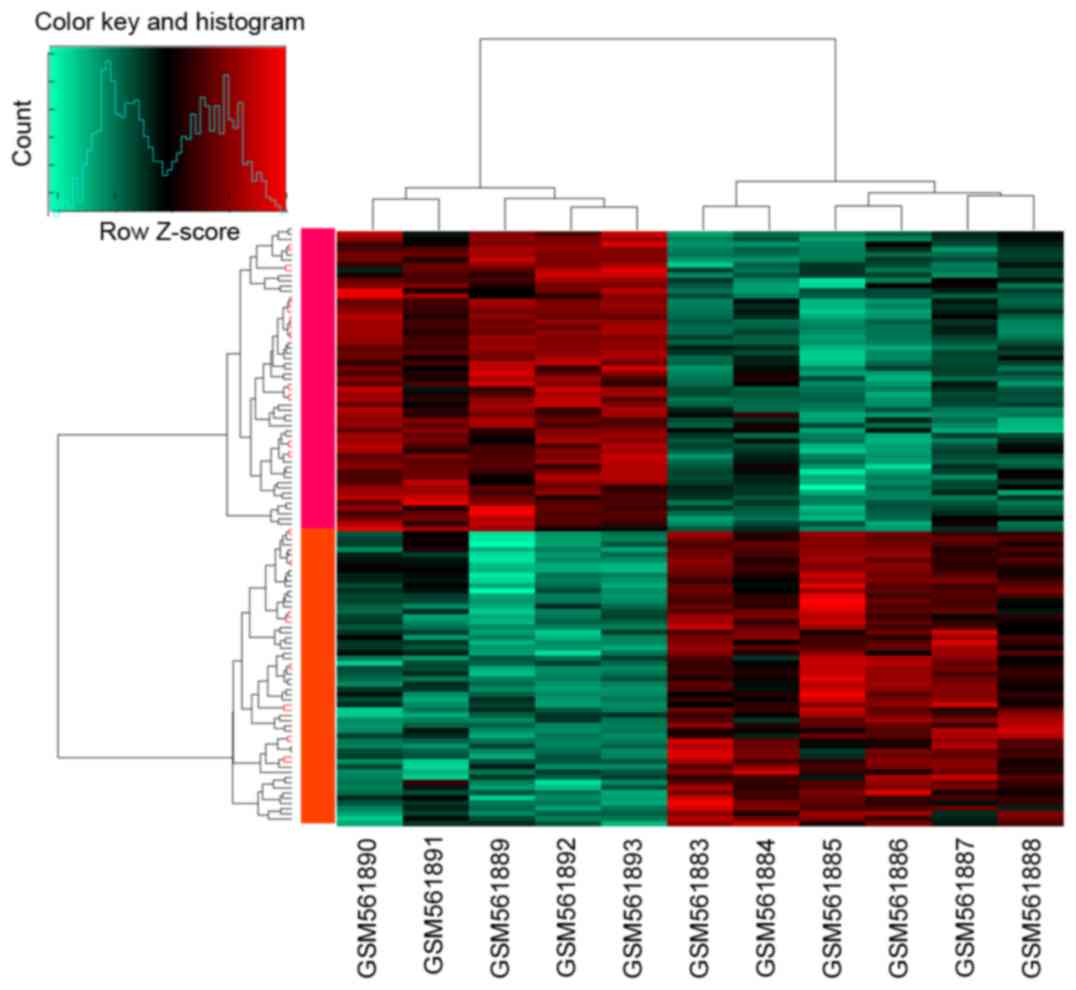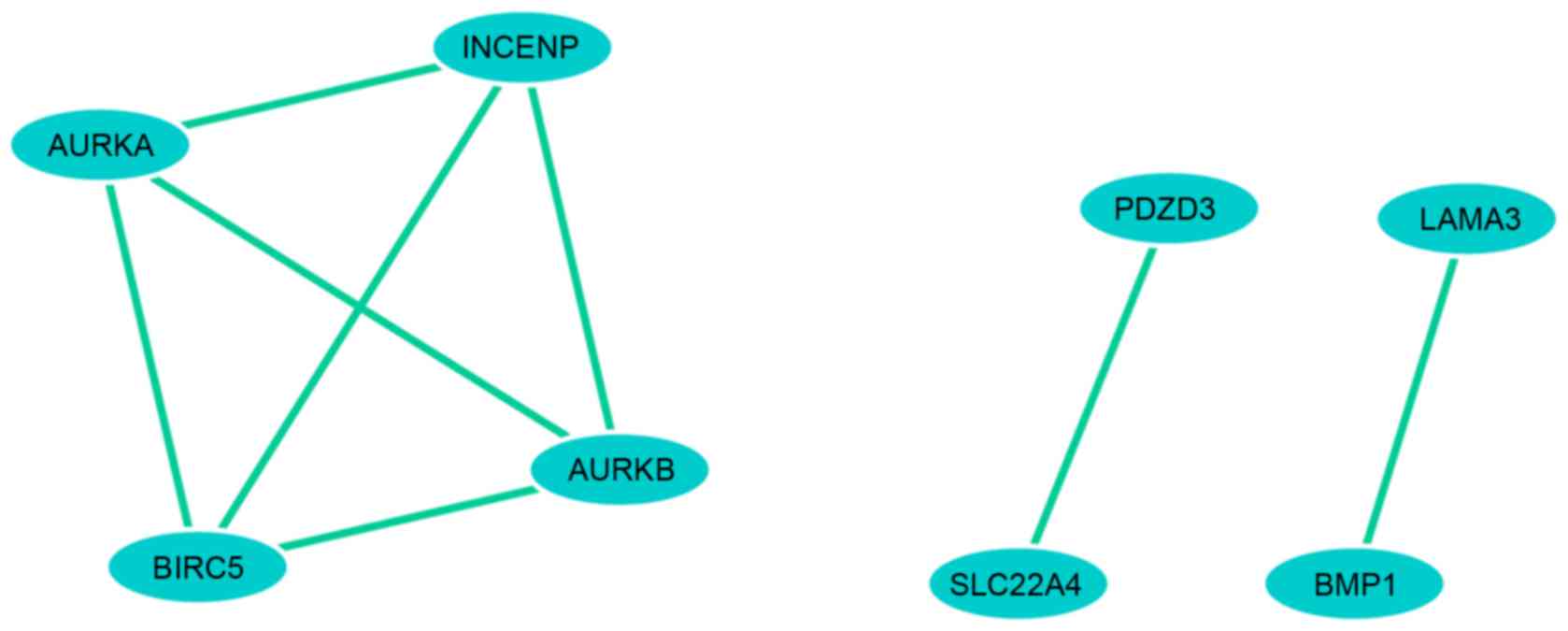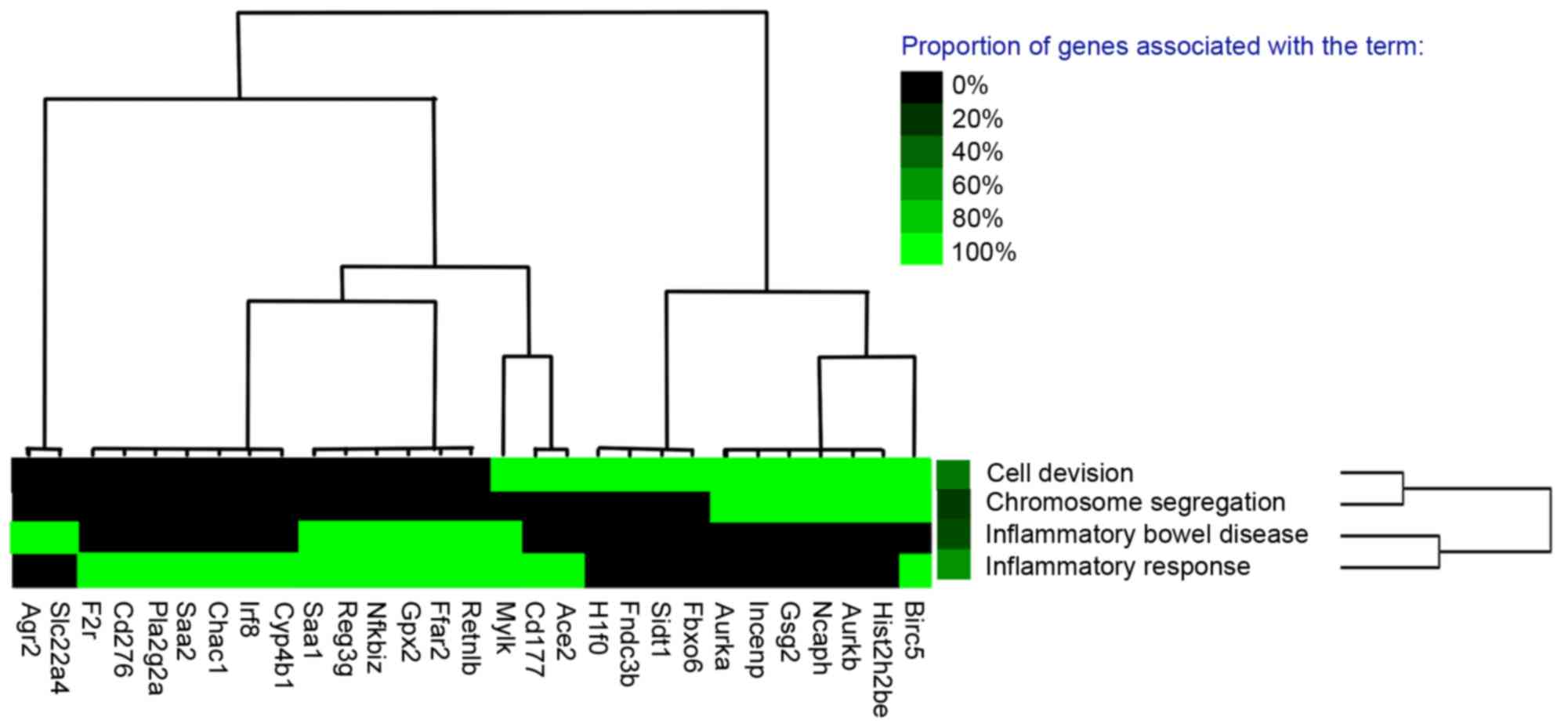|
1
|
Abreu MT, Fukata M and Arditi M: TLR
signaling in the gut in health and disease. J Immunol.
174:4453–4460. 2005. View Article : Google Scholar : PubMed/NCBI
|
|
2
|
Jeurissen SH, Lewis F, van der Klis JD,
Mroz Z, Rebel JM and Ter Huurne AA: Parameters and techniques to
determine intestinal health of poultry as constituted by immunity,
integrity and functionality. Curr Issues Intest Microbiol. 3:1–14.
2002.PubMed/NCBI
|
|
3
|
Ott SJ, Musfeldt M, Wenderoth DF, Hampe J,
Brant O, Fölsch UR, Timmis KN and Schreiber S: Reduction in
diversity of the colonic mucosa associated bacterial microflora in
patients with active inflammatory bowel disease. Gut. 53:685–693.
2004. View Article : Google Scholar : PubMed/NCBI
|
|
4
|
Round JL and Mazmanian SK: The gut
microbiota shapes intestinal immune responses during health and
disease. Nat Rev Immunol. 9:313–323. 2009. View Article : Google Scholar : PubMed/NCBI
|
|
5
|
Qin J, Li R, Raes J, Arumugam M, Burgdorf
KS, Manichanh C, Nielsen T, Pons N, Levenez F, Yamada T, et al: A
human gut microbial gene catalogue established by metagenomic
sequencing. Nature. 464:59–65. 2010. View Article : Google Scholar : PubMed/NCBI
|
|
6
|
Guarner F and Malagelada JR: Gut flora in
health and disease. Lancet. 361:512–519. 2003. View Article : Google Scholar : PubMed/NCBI
|
|
7
|
Jia ZY, Xia Y, Tong D, Yao J, Chen HQ and
Yang J: Module-based functional pathway enrichment analysis of a
protein-protein interaction network to study the effects of
intestinal microbiota depletion in mice. Mol Med Rep. 9:2205–2212.
2014. View Article : Google Scholar : PubMed/NCBI
|
|
8
|
Smith AG, O'Doherty JV, Reilly P, Ryan MT,
Bahar B and Sweeney T: The effects of laminarin derived from
Laminaria digitata on measurements of gut health: Selected
bacterial populations, intestinal fermentation, mucin gene
expression and cytokine gene expression in the pig. Br J Nutr.
105:669–677. 2011. View Article : Google Scholar : PubMed/NCBI
|
|
9
|
Song M and Kellum JA: Interleukin-6. Crit
Care Med. 33 12 Suppl:S463–S465. 2005. View Article : Google Scholar : PubMed/NCBI
|
|
10
|
Reikvam DH, Erofeev A, Sandvik A, Grcic V,
Jahnsen FL, Gaustad P, McCoy KD, Macpherson AJ, Meza-Zepeda LA and
Johansen FE: Depletion of murine intestinal microbiota: Effects on
gut mucosa and epithelial gene expression. PLoS One. 6:e179962011.
View Article : Google Scholar : PubMed/NCBI
|
|
11
|
Altman NS: An introduction to kernel and
nearest-neighbor nonparametric regression. The American
Statistician. 46:175–185. 1992. View Article : Google Scholar
|
|
12
|
Hastie T, Tibshirani R, Narasimhan B and
Gilbert C: Impute: Imputation for microarray data. Bioinformatics.
17:520–525. 2001.PubMed/NCBI
|
|
13
|
Shabalin AA, Tjelmeland H, Fan C, Perou CM
and Nobel AB: Merging two gene-expression studies via
cross-platform normalization. Bioinformatics. 24:1154–1160. 2008.
View Article : Google Scholar : PubMed/NCBI
|
|
14
|
Rudy J and Valafar F: Empirical comparison
of cross-platform normalization methods for gene expression data.
BMC Bioinformatics. 12:4672011. View Article : Google Scholar : PubMed/NCBI
|
|
15
|
Leek JT, Johnson WE, Parker HS, Fertig EJ,
Jaffe AE, Zhang Y, Torres LC and Storey JD: sva: Surrogate Variable
Analysis. R package version 3. 2013.
|
|
16
|
Wang JH, Zhao LF, Lin P, Su XR, Chen SJ,
Huang LQ, Wang HF, Zhang H, Hu ZF, Yao KT and Huang ZX: GenCLiP
2.0: A web server for functional clustering of genes and
construction of molecular networks based on free terms.
Bioinformatics. 30:2534–2536. 2014. View Article : Google Scholar : PubMed/NCBI
|
|
17
|
Puupponen-Pimiä R, Aura AM,
Oksman-Caldentey KM, Myllärinen P, Saarela M, Mattila-Sandholm T
and Poutanen K: Development of functional ingredients for gut
health. Trends Food Sci Technol. 13:3–11. 2002. View Article : Google Scholar
|
|
18
|
Pérez-Cobas AE, Gosalbes MJ, Friedrichs A,
Knecht H, Artacho A, Eismann K, Otto W, Rojo D, Bargiela R, von
Bergen M, et al: Gut microbiota disturbance during antibiotic
therapy: A multi-omic approach. Gut. 62:1591–1601. 2013. View Article : Google Scholar : PubMed/NCBI
|
|
19
|
Barker N: Adult intestinal stem cells:
Critical drivers of epithelial homeostasis and regeneration. Nat
Rev Mol Cell Biol. 15:19–33. 2014. View
Article : Google Scholar : PubMed/NCBI
|
|
20
|
Assimakopoulos SF, Tsamandas AC, Louvros
E, Vagianos CE, Nikolopoulou VN, Thomopoulos KC, Charonis A and
Scopa CD: Intestinal epithelial cell proliferation, apoptosis and
expression of tight junction proteins in patients with obstructive
jaundice. Eur J Clin Invest. 41:117–125. 2011. View Article : Google Scholar : PubMed/NCBI
|
|
21
|
Ding J, Swain JE and Smith GD: Aurora
kinase-A regulates microtubule organizing center (MTOC)
localization, chromosome dynamics, and histone-H3 phosphorylation
in mouse oocytes. Mol Reprod Dev. 78:80–90. 2011. View Article : Google Scholar : PubMed/NCBI
|
|
22
|
Ratushny V, Pathak HB, Beeharry N,
Tikhmyanova N, Xiao F, Li T, Litwin S, Connolly DC, Yen TJ, Weiner
LM, et al: Dual inhibition of SRC and Aurora kinases induces
postmitotic attachment defects and cell death. Oncogene.
31:1217–1227. 2012. View Article : Google Scholar : PubMed/NCBI
|
|
23
|
Nikonova AS, Astsaturov I, Serebriiskii
IG, Dunbrack Jr RL and Golemis EA: Aurora A kinase (AURKA) in
normal and pathological cell division. Cell Mol Life Sci.
70:661–687. 2013. View Article : Google Scholar : PubMed/NCBI
|
|
24
|
Shuda K, Schindler K, Ma J, Schultz RM and
Donovan PJ: Aurora kinase B modulates chromosome alignment in mouse
oocytes. Mol Reprod Dev. 76:1094–1105. 2009. View Article : Google Scholar : PubMed/NCBI
|
|
25
|
Fenton JI, Lavigne JA, Perkins SN, Liu H,
Chandramouli GV, Shih JH, Hord NG and Hursting SD: Microarray
analysis reveals that leptin induces autocrine/paracrine cascades
to promote survival and proliferation of colon epithelial cells in
an Apc genotype-dependent fashion. Mol carcinog. 47:9–21. 2008.
View Article : Google Scholar : PubMed/NCBI
|
|
26
|
Felekkis K, Touvana E, Stefanou C and
Deltas C: microRNAs: A newly described class of encoded molecules
that play a role in health and disease. Hippokratia. 14:236–240.
2010.PubMed/NCBI
|
|
27
|
Vicario M, Martínez C and Santos J: Role
of microRNA in IBS with increased gut permeability. Gut.
59:710–712. 2010. View Article : Google Scholar : PubMed/NCBI
|
|
28
|
Honda R, Körner R and Nigg EA: Exploring
the functional interactions between Aurora B, INCENP, and survivin
in mitosis. Mol Biol Cell. 14:3325–3341. 2003. View Article : Google Scholar : PubMed/NCBI
|
|
29
|
Guta FF, O'Tooleb P and Walsha MA: MS04
P01 Structural and functional studies of the probiotic organism
Lactobacillus salivarius Mario Bumanna, Heinz. Acta Cryst.
63:s1272007. View Article : Google Scholar
|
|
30
|
Yang J, Zappacosta F, Annan RS, Nurse K,
Tummino PJ, Copeland RA and Lai Z: The catalytic role of INCENP in
Aurora B activation and the kinetic mechanism of Aurora B/INCENP.
Biochem. J. 417:355–360. 2009.
|
|
31
|
Chang JL, Chen TH, Wang CF, Chiang YH,
Huang YL, Wong FH, Chou CK and Chen CM: Borealin/Dasra B is a cell
cycle-regulated chromosomal passenger protein and its nuclear
accumulation is linked to poor prognosis for human gastric cancer.
Exp Cell Res. 312:962–973. 2006. View Article : Google Scholar : PubMed/NCBI
|
|
32
|
Neufert C, Pickert G, Zheng Y, Wittkopf N,
Warntjen M, Nikolaev A, Ouyang W, Neurath MF and Becker C:
Activation of epithelial STAT3 regulates intestinal homeostasis.
Cell Cycle. 9:652–655. 2010. View Article : Google Scholar : PubMed/NCBI
|
|
33
|
Hooper LV, Littman DR and Macpherson AJ:
Interactions between the microbiota and the immune system. Science.
336:1268–1273. 2012. View Article : Google Scholar : PubMed/NCBI
|
|
34
|
Kamada N, Seo SU, Chen GY and Núñez G:
Role of the gut microbiota in immunity and inflammatory disease.
Nat Rev Immunol. 13:321–335. 2013. View
Article : Google Scholar : PubMed/NCBI
|
|
35
|
Tremaroli V and Bäckhed F: Functional
interactions between the gut microbiota and host metabolism.
Nature. 489:242–249. 2012. View Article : Google Scholar : PubMed/NCBI
|
|
36
|
Shekhawat PS, Sonne S, Carter AL, Matern D
and Ganapathy V: Enzymes involved in L-carnitine biosynthesis are
expressed by small intestinal enterocytes in mice: Implications for
gut health. J Crohns Colitis. 7:e197–e205. 2013. View Article : Google Scholar : PubMed/NCBI
|
|
37
|
Tokuhiro S, Yamada R, Chang X, Suzuki A,
Kochi Y, Sawada T, Suzuki M, Nagasaki M, Ohtsuki M, Ono M, et al:
An intronic SNP in a RUNX1 binding site of SLC22A4, encoding an
organic cation transporter, is associated with rheumatoid
arthritis. Nat Genet. 35:341–348. 2003. View Article : Google Scholar : PubMed/NCBI
|
|
38
|
Ferraris A, Torres B, Knafelz D, Barabino
A, Lionetti P, de Angelis GL, Iacono G, Papadatou B, D'Amato G, Di
Ciommo V, et al: Relationship between CARD15, SLC22A4/5 and DLG5
polymorphisms and early-onset inflammatory bowel diseases: An
Italian multicentric study. Inflamm Bowel Dis. 12:355–361. 2006.
View Article : Google Scholar : PubMed/NCBI
|
|
39
|
Kelly D, King T and Aminov R: Importance
of microbial colonization of the gut in early life to the
development of immunity. Mutat Res. 622:58–69. 2007. View Article : Google Scholar : PubMed/NCBI
|


















